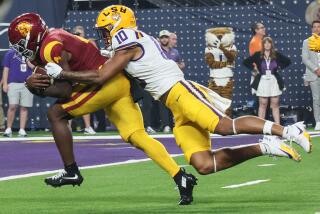Non-NBC Outlets Walk an Olympic Tightrope : Television: Restrictions imposed by the IOC bar other stations from showing events in Barcelona until NBC ends its prime-time coverage.
When Magic Johnson strained a hamstring near his right knee during the first half of the United Statesâ 103-70 Olympic menâs basketball victory over Croatia Monday, KABC-TV Channel 7âs Todd Donoho could not show videotape of the injury on any of his sportscasts that day.
Instead, Donoho was limited to reading a story about it, followed by a graphic giving the score. Sportscasters on other stations were similarly handicapped.
In an era where videotaped highlights of the dayâs events fill most sportscasts, those same sportscasts take on a more primitive look during the Olympic Games.
International Olympic Committee rules and broadcast agreements bar other stations and networks from showing the dayâs highlights until NBCâs prime-time telecast is over. For Southern California and most of the rest of the nation, that is midnight.
Non-NBC outlets are then limited to showing two minutes of the previous dayâs highlights during regularly scheduled newscasts three hours apart no more than three times during a 24-hour period. (A 4-6:30 p.m. news block is considered a single newscast for highlights purposes.)
The restrictions are designed to protect the network holding the Olympic rights from having to compete against its own coverage.
In 1984, the same-day highlights embargo drove KTLA Channel 5 senior sports producer Cathleen Karp âstark raving mad.â
âIf somebody set a world record three doors away, I couldnât use it,â Karp said.
But after another Summer Olympics and two more Winter Games, Karp now says she has âmellowed about it.â
âI feel that if you pay hundreds of millions of dollars for the rights (NBC paid $401 million for the 1992 Summer Olympic rights), you can do whatever you want,â she said. âItâs bothersome, but you learn ways around it.â
One approach Karp has taken to get around the absence of same-day videotape is to use sound bites supplied by CNN.
With NBC televising these Olympics on a delayed basis, sportscasters face another dilemma: whether to report the dayâs results or withhold them. Either tact can draw criticism.
On its 5, 6 and 7 p.m. newscasts, KNBC-TV Channel 4 isnât giving results of events that havenât been televised by NBC yet. While such an approach might not be popular with TV critics, KNBC sportscaster Bret Lewis argued that it meets with the viewersâ approval.
âIâve been pilloried by fans for giving results of events that were carried on a delayed basis on other stations,â Lewis said. âIf you do say youâre going to hold off on something, you rarely get a complaint.â
KABCâs Donoho received similar feedback during the Winter Olympics last February, getting five to six calls a day criticizing him for reporting on events that CBS would be broadcasting later.
âWe canât pretend that people are living in a cave until they get home at night to watch the Olympics,â Donoho said. âWe are a news operation and these are news stories that warrant being reported.â
To Donoho, there is a way the situation could have been avoided.
âIf NBC wanted to, they could carry these Olympics live,â Donoho said. âI donât think it is every other media outletâs responsibility to cooperate with NBC and not provide the results of the Olympics because they chose to run the Olympics on a delayed basis.â
More to Read
Go beyond the scoreboard
Get the latest on L.A.'s teams in the daily Sports Report newsletter.
You may occasionally receive promotional content from the Los Angeles Times.






